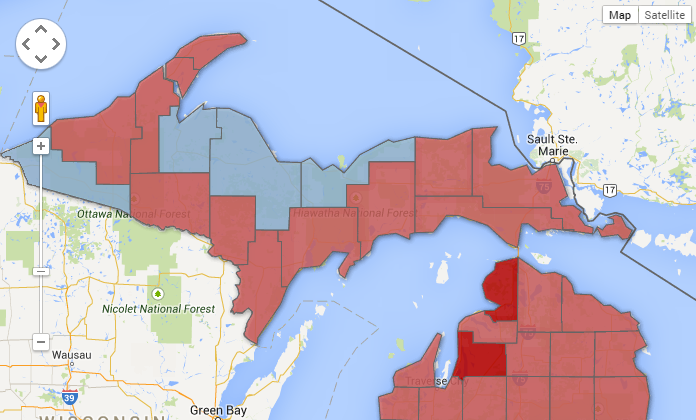 The less ambitious road-funding plan the House sent to the Senate in May might be a thing of the past, but it’s still the plan many House Republicans prefer and aren’t giving up on.
The less ambitious road-funding plan the House sent to the Senate in May might be a thing of the past, but it’s still the plan many House Republicans prefer and aren’t giving up on.
By the time the Senate’s version of ![]() HB 5477 is completely phased in in 2018, the changes would bring in about $1.2 billion in extra revenue each year and a tax rate of 15.5 percent.
HB 5477 is completely phased in in 2018, the changes would bring in about $1.2 billion in extra revenue each year and a tax rate of 15.5 percent.
That’s a large jump from the 6 percent rate the House had originally proposed. And it’s a jump many House Republicans aren’t willing to take.
“I think they’ve sent us back something that’s over done,” Rep. Kevin DALEY (R-Lum) said of the plan. “I don’t think we need to put in that much more.”
And Daley is far from the only House Republican who’s working on transportation issues and feels that way.
“I’m standing with the House package,” as Rep. Peter PETTALIA (R-Presque Isle) said. He added, “I am very confident that my constituents do not want an increase.”
The Senate’s version of the larger transportation funding package would bring in about $1.3 billion in extra revenue for roads and bridges by 2018. The House’s original plan would have brought in about $500 million extra.
As the House prepares to consider the Senate proposal, MIRS talked to eight of the nine Republicans on the House Transportation and Infrastructure Committee. None of the eight were quick to speak out in support of the Senate plan.
They either wanted changes or felt the 15.5 percent wholesale rate was too high.
Two schools of thought seems to be developing among House Republicans:
– Stand by the original plan the chamber sent to the Senate
– Look for a compromise that’s somewhere between what the House passed and what the Senate passed.
Transportation Committee member Kurt HEISE(R-Plymouth) said many House Republicans feel that they’ve already made their decision on road funding and that decision was to go with the $500 million plan.
Heise has concerns about the money going to mass transit under the Senate plan. And like many in the House GOP, Heise also has concerns that the Senate plan would pump too much money into road construction efforts too quickly. That could push up prices and perhaps create more work than the industry can effectively handle.
Likewise, Rep. Mike MCCREADY (R-Birmingham) said the Legislature should be careful about how it uses tax dollars. The state should allow road builders to ramp up over time to meet the new demand in order to best use the extra funding coming their way.
McCready said he thought the House plan would have allowed for a reasonable implementation timeline and for work to still get completed.
“I thought that was a great start,” said McCready, who cautioned he’s still digging into the details of a Senate plan, that gets close to the dollar amount transportation interest groups says needs to be invested in Michigan’s ailing roads.
Rep. Ben GLARDON (R-Owosso), majority vice chair of the House transportation committee, said he’s keeping an open mind about the Senate plan.
However, Glardon said he hopes the Legislature can come up with a different, long-term solution that doesn’t dump money into the construction efforts too quickly.
Glardon said he’s also not sure about doubling the gas tax.
Similarly, Rep. Dan LAUWERS (R-Brockway) said he doesn’t agree with the tax increase in the Senate plan. He also wants to see the new dollars flow to the road construction efforts more slowly to give the industry time to ramp up.
The slower implementation timeline, Lauwers said, would give lawmakers time to figure out if the extra dollars were having the impact they’re suppose to.
“Let’s see them walk before they run,” Lauwers said.
Other Republicans on the transportation committee voiced other concerns.
Rep. Margaret O‘BRIEN(R-Portage) said she wants to see equity among vehicles whether it’s a hybrid or another alternative fuel vehicle. Those vehicles may use less gas so their owners could pay less in tax under the Senate plan.
“I just want to make sure that we’ve got a system that’s equitable, competitive and will be long term,” she said. “I don’t want a three-or four-year fix, but will actually work for the future.”
Protections to make sure the new revenue is going to roads and not other expenses are important to Rep. Brad JACOBSEN (R-Oxford).
Jacobsen said upping the tax to 9 percent may be OK, but 15.5 percent may be too much.
But he also said he’s happy that the Senate responded to the House’s proposal.
“Now we need to come up with a compromise,” he said.



